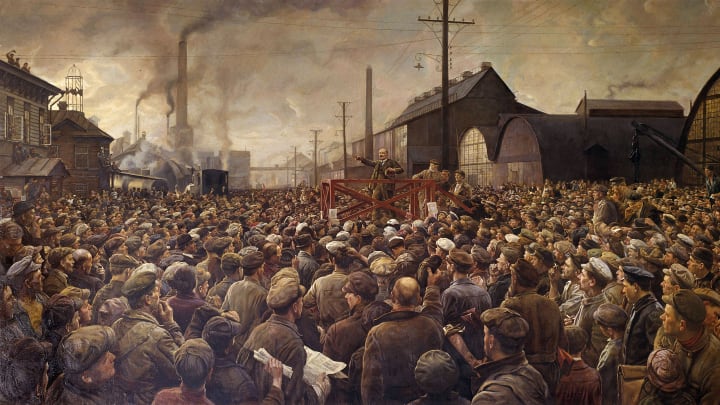The Causes and Outcomes of the Russian Revolution

The causes of the Russian Revolution were deeply rooted in the political and social structure of the Russian Empire. The autocratic rule of the Tsar, characterized by a lack of political freedoms and widespread repression, created significant discontent among the population. The failure of the Tsarist regime to implement meaningful political reforms and address the demands for a constitutional government exacerbated this discontent.
Economic factors also played a crucial role in fueling the revolution. Russia's economy was largely agrarian, with a significant portion of the population living in poverty. The harsh conditions faced by peasants, including heavy taxation, lack of land, and feudal-like labor obligations, led to widespread grievances. The industrial working class in the cities also faced poor working conditions, low wages, and limited rights, contributing to labor unrest and strikes.
The impact of World War I was a significant catalyst for the revolution. The war placed immense strain on Russia's economy and military, leading to food shortages, inflation, and widespread suffering. The Russian military's repeated defeats and the high casualties further eroded confidence in the Tsarist regime. The war also exposed the inefficiencies and corruption within the government and military leadership, intensifying public discontent.
The revolution began with the February Revolution in 1917, which saw the spontaneous uprising of workers, soldiers, and peasants in Petrograd (now St. Petersburg). The immediate trigger was the severe food shortages and the deteriorating living conditions. The protests and strikes quickly escalated, leading to the abdication of Tsar Nicholas II and the establishment of a provisional government. However, the provisional government, led by Alexander Kerensky, struggled to address the pressing issues of war, land reform, and economic hardship, leading to further instability.
The October Revolution, led by the Bolshevik Party under Vladimir Lenin, marked the second phase of the Russian Revolution. The Bolsheviks, who advocated for peace, land redistribution, and workers' control of industry, gained popular support by promising to address the immediate needs of the population. On October 25, 1917, the Bolsheviks successfully overthrew the provisional government in a relatively bloodless coup, seizing control of key government institutions in Petrograd.
The outcomes of the Russian Revolution were profound and transformative. The establishment of a communist government under the Bolsheviks led to the creation of the Soviet Union, the world's first socialist state. The Bolsheviks implemented radical reforms, including the nationalization of land, banks, and industries, and the establishment of a planned economy. The new government also withdrew Russia from World War I, signing the Treaty of Brest-Litovsk with Germany in 1918.
The revolution also sparked a brutal civil war between the Bolshevik Red Army and the anti-Bolshevik White forces, along with various other factions. The civil war, which lasted from 1918 to 1922, resulted in widespread destruction, famine, and loss of life. The Bolsheviks ultimately emerged victorious, consolidating their power and establishing a one-party state under the Communist Party.
The impact of the Russian Revolution extended far beyond Russia's borders. It inspired revolutionary movements and socialist parties worldwide, contributing to the spread of communist ideology. The establishment of the Soviet Union also led to significant geopolitical shifts, influencing the course of international relations and contributing to the ideological divide of the Cold War.
The revolution had lasting social and cultural impacts on Russian society. The Bolsheviks sought to transform society through policies aimed at promoting gender equality, education, and workers' rights. The role of women in the workforce and political life was significantly expanded, and efforts were made to improve literacy and access to education. However, the repressive measures implemented by the Bolsheviks, including censorship, political purges, and the suppression of dissent, created a climate of fear and control.
In conclusion, the Russian Revolution was a pivotal event that resulted from a combination of political, social, and economic factors. Its outcomes, including the establishment of a communist government and the creation of the Soviet Union, had profound and far-reaching impacts on Russia and the world. The legacy of the revolution continues to influence contemporary discussions on governance, ideology, and social change.